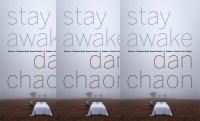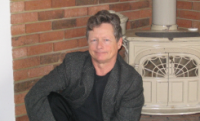Lit Journals/Creative Process/Publishing
What’s in store for 2010?
I edited an anthology that I’m really excited about, CITY SAGES: BALTIMORE (CityLit Press, 2010), that’s coming out in April. It’s a collection of authors, dead and alive, who’ve lived and written in Baltimore. Edgar Allan Poe, F. Scott Fitzgerald, and Gertrude Stein have stories beside Anne Tyler, Alice McDermott, and Stephen Dixon, who share space with Madison Smartt Bell, Laura Lippman, Jessica Anya Blau, Geoff Becker, Michael Kimball, me. It’s the first anthology of its kind for Baltimore. It basically came about from my co-hosting of the 510 Reading Series with Michael Kimball. We’ve hosted so many great Baltimore authors that nobody knows about in our suburbs, down our streets. An anthology seemed only fitting to create awareness of our great literary tradition and the writers carrying it on.
The anthology was challenging and fun to research, to contact so many authors I may never have had a reason to, to get a letter from Anne Tyler in the mail saying of course I can excerpt from DINNER AT THE HOMESICK RESTAURANT or talking to Stephen Dixon on the phone about FROG. We’ve planning a big roll out of readings, and CityLit also has approached me about becoming the series editor so we can expand the anthology to other cities, maybe Pittsburgh, Nashville, San Francisco, New York.
I also learned in 2010 that Dzanc Books is publishing a story collection/novella of mine in 2013. Dan Wickett and Steven Gillis are high priests of the independent press movement, in my mind, and I’m so honored that they consider me worthy to publish beside Peter Markus, Michael Czyniejewski, Terese Svoboda, Kyle Minor, Laura van den Berg, Robert Lopez, gosh, so many great authors.
I also just finished a second novella that I’m excited to send out. I’m finding a lot of comfort in 20,000-word stories lately. They’re much more manageable, vision-wise, than say, the 65,000-word novel I finished last year, and challenging in an entirely different way. There’s an expectation of precision and pace and tone that are so exciting and intriguing.
Talk about some of the challenges, some of the pleasures in running a literary journal.
I think jmww probably shares the same challenges as any journal–getting the word out, getting hits, making it fresh for staff to contribute five years of their life to what is essentially a huge labor of love. For me, though, the journal has exposed me to so many great writers who do so many diverse and exciting things, people that challenge and stimulate my own growth. And I’m continually honored that people consider us an outlet for their work. Of course, there are the challenges of economics–can we fund what we are dreaming for the journal, or do we have to do what we can afford? For awhile I’ve been wanting to start an imprint but, aside from the money part of it (jmww comes out of my pocket), there’s also the issue of staffing, of having dedicated people reading manuscripts and living and breathing our vision and at the same time me not wanting to ask too much of people, from their already-full and complex lives. It’s definitely a balancing act. I often wonder how some of the other editors with, say, children, or other larger commitments, for instance, Roxane Gay being a PhD candidate and being the managing editor of PANK, do as much as they do.
Getting the word out is a challenge, especially with so many other journals out there, the numbers for I find staggering. Is that something you ever consider, ever lament, that there are just too many out there…that even if you are heard there is some sort of dilution, or do all these journals satisfy a need?
I think, as a writer and editor, the more, the better. There are so many tastes out there and so many levels of writers. I think it’s a bad thing to decide one or two arbiters of taste and then put writers into three or four boxes. Of course there’s some junk out there, but I’d rather the audience be the judge of that than the literary world–because we know what Ploughshares considers junk may not be junk at all for jmww or Emprise Review or anyone else. I think it gives everyone a fair shot. If you didn’t go to a big program (or any program), you don’t have to fret that the big-programs aren’t going to publish you in their journals because you’re a nobody. The larger field is very democratic, and the newer journals springing up keep everyone else who’s more established on their toes (i.e., podcasts, blog designs, daily content, multimedia, shorter response times, cheaper operating costs).
In your creative process as a writer, do you have a preferred starting point?
I like the beginning, but sometimes I like the end. Sometimes I know where people are but not how they got there, and sometimes I know where people are but not where they are going. It’s all relative, though–you can take any person and move forward or backward, but the trick is finding where the movement is, the earthquake. Sometimes it’s just a sentence in my head that sounds good. Sometimes it’s an anecdote that turns into something bigger. Oftentimes it’s a dream, and capturing the lyrical, emotive nonsense that somehow made sense in the space of dreams but does not translate easily into real life. Sometimes it’s just the sound of words together, a rhythm that I add more words to. I love words and how they look together. Sometimes writing seems like knitting to me. The only problem is that I’m always knitting crazy quilts too long for the feet and too short for the head.
When a story is finished, edited, published, if there is one thing you’ve accomplished, what do you hope that is?
I like to know that I have contributed to dialogue of the world, in some way, literary or not. I have reacted to the world and created this thing and there’s a certain immortality in it. I read and respond to so much work, so many writers, in my own writing, and it’s cool to think that someone out there may be responding to me in his or her work.
Is there a particular impetus that helps spur you to write?
Patience, and dreams. I don’t set aside time to write because usually it happens when it’s going to happen. Even if it’s been awhile, a week or two, since I’ve worked on something, I just do other things. So much of my work comes from dreams–when I actually do sleep (I’m a pretty bad insomniac), my mind seems pretty fertile. And my filters are down, so a lot of the crazy shit pops up that I might have dismissed in my waking hours.
Is there a writer you think warrants critical re-evaluation?
I think that Nathan Leslie is very underrated. He has this quiet style, very solid, five books of fiction. He constructs stories so well, from so many points of view, and I would be very proud, very blessed, if I had wound up having a career like his.
A writer or a reader our readers should track down?
I’m always afraid I’m going to forget someone, so I’ll just mention a few books I’ve been reading the past few months that I’m excited about. I just finished Scott McClanahan’s Stories II, which was a great collection of anecdotal, semi-autobiographical stories. Laura van den Berg’s What the World Will Look Like When All the Water Leaves Us, Rachel Sherman’s Living Room, Dylan Landis’ Normal People Don’t Live Like This, Sherrie Flick’s Reconsidering Happiness, James Magruder’s Sugarless, Joe Young’s Easter Rabbit, Josh Weil’s The New Valley, Kevin Sampsell’s A Common Pornography, and Donald Breckenridge’s You Are Here also are must reads/books that I must read. I’m also excited about Matt Bell’s collection coming out with Keyhole/Dzanc.
Jen, thanks for your time.
Thanks for the great questions!
Check out Big Boy in Volume 12 of Emprise Review.
-
Interviewed by Patrick Mcallaster







